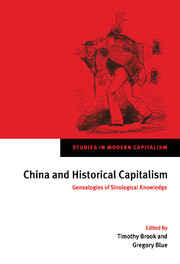Book contents
- Frontmatter
- Contents
- Preface
- Major dynastic periods in China's history
- 1 Introduction
- 2 The West, capitalism, and the modern world-system
- 3 China and Western social thought in the modern period
- 4 Capitalism and the writing of modern history in China
- 5 Towards a critical history of non-Western technology
- 6 The political economy of agrarian empire and its modern legacy
- Bibliography
- Index
1 - Introduction
Published online by Cambridge University Press: 22 September 2009
- Frontmatter
- Contents
- Preface
- Major dynastic periods in China's history
- 1 Introduction
- 2 The West, capitalism, and the modern world-system
- 3 China and Western social thought in the modern period
- 4 Capitalism and the writing of modern history in China
- 5 Towards a critical history of non-Western technology
- 6 The political economy of agrarian empire and its modern legacy
- Bibliography
- Index
Summary
The historical experience of the world has been as much the history of China as of the West. This modest fact has found recognition in the West only recently, and still only in certain circles. The dominance of models of society derived from the European experience in history and the social sciences has served to block this recognition. Too often the generalizations of social science – and this is as true in Asia as in the West – rest on the belief that the West occupies the normative starting position for constructing general knowledge. Almost all our categories – politics and economy, state and society, feudalism and capitalism – have been conceptualized primarily on the basis of Western historical experience. Until recently, China was sometimes taken into account, yet it mattered only to the extent to which it provided corollary proofs for European solutions to European questions. The teleologies of meaning attached to these concepts of analysis in European history have remained intact in spite of the often glaring counterexamples that China and the rest of Asia offer to Western observers. In this volume, we aspire to take account of China's historical experience in a different way: in the first three chapters, to probe the impact that Western genealogies of historical knowledge have had on how China is understood; and in the latter two, to suggest lines of flight from this dead end.
- Type
- Chapter
- Information
- China and Historical CapitalismGenealogies of Sinological Knowledge, pp. 1 - 9Publisher: Cambridge University PressPrint publication year: 1999
- 3
- Cited by



